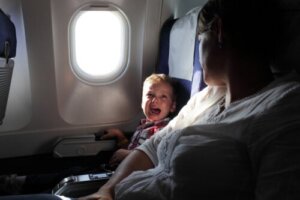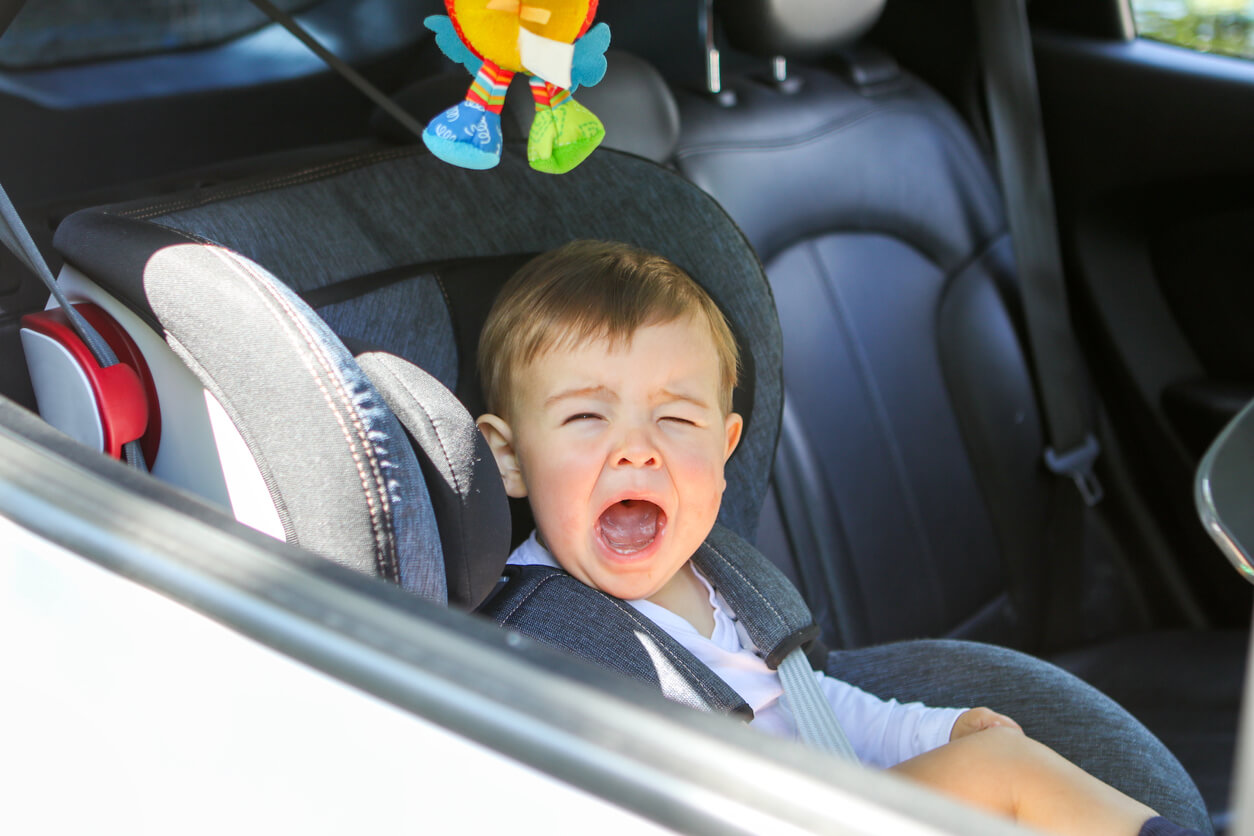Traveling with High-Needs Children


Written and verified by the psychologist Elena Sanz Martín
Going on a trip with a child is very different from doing it alone, as a couple, or with adult friends. But the situation becomes even more complicated if the baby has a difficult temperament or is very demanding. Inconsolable crying, sleepless nights, uncertainty about how they’ll behave, or shame about what other people will think can keep you from wanting to leave home with your child. However, there are some tips for traveling with high-needs children that you may find helpful.
First, remember that you’re not alone: Many parents face similar situations every day. In fact, it’s estimated that high-needs babies represent 10-15% of all babies. So, the challenge is to understand them, accompany them, and help them develop in the best way.
High-needs babies are extremely sensitive and experience the world more intensely and profoundly than others. But this doesn’t imply that the family should deprive itself of certain enriching experiences such as traveling; you just have to know how to do it.
Some keys for traveling with high needs children
If you have a high-needs baby or child, the following recommendations can help make family travel more satisfying for everyone.
Travel when you’re ready
It’s undeniable that traveling with high-needs children is scary, as there may be several tense or desperate moments during the trip for which you’re not always prepared. Don’t force yourself to travel until you feel up to it.
It may take several months before you can get used to motherhood and adjust to the needs and demands of your little one. Once you understand and feel more confident in their care, traveling together will be easier.
Some parents even try to avoid travel during their children’s early years. When children are able to talk and are a little older, travel is more bearable. However, you don’t necessarily have to wait this long, just listen to yourself and decide when the time is right.

Choose a good destination
Especially for the first few occasions, it may be convenient to choose a destination that’s nearby and familiar where you know you’ll feel comfortable. Also, try to start with a short getaway, so you can acclimate and size up a larger trip with your baby.
Preferably, opt for open, quiet destinations with natural surroundings. High-needs infants may feel anxious or overwhelmed by too much stimulation, so a big noisy city or a crowded touristy beach may not be the best for them.
Decide beforehand how to approach the journey
The choice of means of transport is also an important issue, as many high-needs babies hate car journeys. To put ourselves in their shoes, let’s understand that they’re tied to a seat, without freedom of movement, and without the entertainment they need. Even, in many cases, without the company of their parents, if they have to drive.
So, if you decide to travel by car, try to be in the back seat with your baby so that they can see you, touch you, and feel close to you. Stock up on books, toys, or coloring books that can entertain them during the trip; sing to them or play a game. It’s possible that as soon as you stop tending to them and stimulating them, they’ll start crying, so be patient.
Other means of transport, such as a train, can be more bearable, as the child is loose and you can move around the aisles and carriages. However, you may be worried about disturbing other passengers if your baby starts crying inconsolably. At these times, try to stay calm so that you can relax your baby.
If possible, try to make your journeys coincide with your baby’s usual nap times. Going to sleep will help make the trip shorter and less of a hassle for everyone. However, it may be necessary to stop (if traveling by car), get up, and change activities on many occasions.
Organize travel and routines
High-needs children find it difficult to adapt to new people, situations, and environments, so travel can be a real problem for them at first.
To make it easier for them to adapt, it’s important to respect their schedules and needs. As you know, these little ones are quite irregular and unpredictable and don’t have fixed feeding or sleeping routines. However, we recommend not postponing their needs once they appear.
Continuing with a cultural visit when your baby is hungry or keeping your child out and about when they’re is sleepy can end up very unpleasant for everyone. So, assume that these trips are going to be different, less scheduled, and more spontaneous, and adapt to the rhythms of your little one.
Finally, now it’s not about discovering or making the most of the destination, but about enjoying this experience as a family. Be flexible in your expectations.

Patience and a positive mood for traveling with high-needs children
The most important thing when traveling with high-needs children is to remain calm and in a positive frame of mind. It really will be a challenging experience and your patience will be tested on numerous occasions. However, remember that these infants are especially sensitive to their parents’ moods and are more influenced by them than other children.
If you become overwhelmed, desperate, or lose your temper, you’ll only increase your child’s anxiety and discomfort. Try to adopt a calm, flexible, and understanding attitude during the trip; focus on enjoying the small moments and don’t set rigid expectations. Over time, you’ll all adapt to traveling as a family and it will become an increasingly rewarding experience.
Going on a trip with a child is very different from doing it alone, as a couple, or with adult friends. But the situation becomes even more complicated if the baby has a difficult temperament or is very demanding. Inconsolable crying, sleepless nights, uncertainty about how they’ll behave, or shame about what other people will think can keep you from wanting to leave home with your child. However, there are some tips for traveling with high-needs children that you may find helpful.
First, remember that you’re not alone: Many parents face similar situations every day. In fact, it’s estimated that high-needs babies represent 10-15% of all babies. So, the challenge is to understand them, accompany them, and help them develop in the best way.
High-needs babies are extremely sensitive and experience the world more intensely and profoundly than others. But this doesn’t imply that the family should deprive itself of certain enriching experiences such as traveling; you just have to know how to do it.
Some keys for traveling with high needs children
If you have a high-needs baby or child, the following recommendations can help make family travel more satisfying for everyone.
Travel when you’re ready
It’s undeniable that traveling with high-needs children is scary, as there may be several tense or desperate moments during the trip for which you’re not always prepared. Don’t force yourself to travel until you feel up to it.
It may take several months before you can get used to motherhood and adjust to the needs and demands of your little one. Once you understand and feel more confident in their care, traveling together will be easier.
Some parents even try to avoid travel during their children’s early years. When children are able to talk and are a little older, travel is more bearable. However, you don’t necessarily have to wait this long, just listen to yourself and decide when the time is right.

Choose a good destination
Especially for the first few occasions, it may be convenient to choose a destination that’s nearby and familiar where you know you’ll feel comfortable. Also, try to start with a short getaway, so you can acclimate and size up a larger trip with your baby.
Preferably, opt for open, quiet destinations with natural surroundings. High-needs infants may feel anxious or overwhelmed by too much stimulation, so a big noisy city or a crowded touristy beach may not be the best for them.
Decide beforehand how to approach the journey
The choice of means of transport is also an important issue, as many high-needs babies hate car journeys. To put ourselves in their shoes, let’s understand that they’re tied to a seat, without freedom of movement, and without the entertainment they need. Even, in many cases, without the company of their parents, if they have to drive.
So, if you decide to travel by car, try to be in the back seat with your baby so that they can see you, touch you, and feel close to you. Stock up on books, toys, or coloring books that can entertain them during the trip; sing to them or play a game. It’s possible that as soon as you stop tending to them and stimulating them, they’ll start crying, so be patient.
Other means of transport, such as a train, can be more bearable, as the child is loose and you can move around the aisles and carriages. However, you may be worried about disturbing other passengers if your baby starts crying inconsolably. At these times, try to stay calm so that you can relax your baby.
If possible, try to make your journeys coincide with your baby’s usual nap times. Going to sleep will help make the trip shorter and less of a hassle for everyone. However, it may be necessary to stop (if traveling by car), get up, and change activities on many occasions.
Organize travel and routines
High-needs children find it difficult to adapt to new people, situations, and environments, so travel can be a real problem for them at first.
To make it easier for them to adapt, it’s important to respect their schedules and needs. As you know, these little ones are quite irregular and unpredictable and don’t have fixed feeding or sleeping routines. However, we recommend not postponing their needs once they appear.
Continuing with a cultural visit when your baby is hungry or keeping your child out and about when they’re is sleepy can end up very unpleasant for everyone. So, assume that these trips are going to be different, less scheduled, and more spontaneous, and adapt to the rhythms of your little one.
Finally, now it’s not about discovering or making the most of the destination, but about enjoying this experience as a family. Be flexible in your expectations.

Patience and a positive mood for traveling with high-needs children
The most important thing when traveling with high-needs children is to remain calm and in a positive frame of mind. It really will be a challenging experience and your patience will be tested on numerous occasions. However, remember that these infants are especially sensitive to their parents’ moods and are more influenced by them than other children.
If you become overwhelmed, desperate, or lose your temper, you’ll only increase your child’s anxiety and discomfort. Try to adopt a calm, flexible, and understanding attitude during the trip; focus on enjoying the small moments and don’t set rigid expectations. Over time, you’ll all adapt to traveling as a family and it will become an increasingly rewarding experience.
All cited sources were thoroughly reviewed by our team to ensure their quality, reliability, currency, and validity. The bibliography of this article was considered reliable and of academic or scientific accuracy.
- Thomas, A., & Chess, S. (1986). Longitudinal Study: From Infancy to Early Adult Life. The study of temperament: Changes, continuities, and challenges, 39.
- Sears, W. (2020, 31 diciembre). Raising a High Needs Baby. Ask Dr Sears. https://www.askdrsears.com/topics/health-concerns/fussy-baby/high-need-baby/high-needs-baby/
This text is provided for informational purposes only and does not replace consultation with a professional. If in doubt, consult your specialist.








